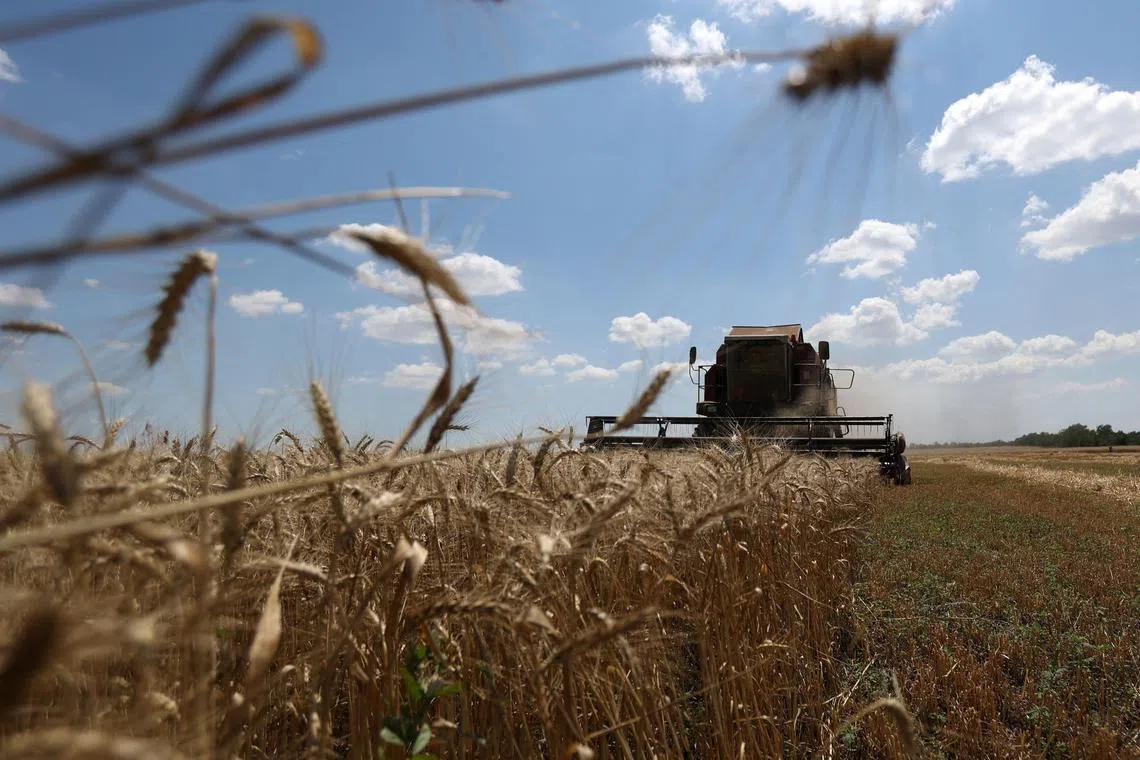UN aid chief to Russia: Don't 'chuck away' Black Sea grain deal
Sign up now: Get ST's newsletters delivered to your inbox

A combine harvests wheat in Ukraine's Mykolaiv region.
PHOTO: AFP
Follow topic:
UNITED NATIONS - If Russia does not agree to extend a deal allowing the safe export of grain and fertiliser from Ukrainian ports,
Russia has threatened to quit the deal, which expires on July 17, because it says several demands to dispatch its own grain and fertiliser have not been met.
The last three ships travelling under the deal are loading cargoes at the Ukrainian port of Odesa and are likely to depart on Monday.
“The world has seen the value of the Black Sea Initiative... this isn’t something you chuck away,” the UN’s Martin Griffiths told reporters.
The United Nations and Turkey brokered the Black Sea Grain Initiative with Russia and Ukraine in July 2022 to help tackle a global food crisis worsened by Moscow’s invasion of its neighbour and blockade of Ukrainian Black Sea ports.
Ukrainian President Volodymyr Zelensky discussed the grain deal with Turkish President Tayyip Erdogan in Istanbul on Friday.
More than 32 million tonnes of corn, wheat and other grains have been exported by Ukraine under the arrangement. Russia has complained that not enough reaches poor countries, but the United Nations argues that it has benefited those states by helping lower food prices more than 20 per cent globally.
Mr Griffiths is the lead UN official on the Ukraine Black Sea deal, while senior UN trade official Rebeca Grynspan is working to ease Russia’s food and fertiliser exports.
Ms Grynspan hopes to travel to Moscow before July 17 and Griffiths hopes to meet with the parties next week in Istanbul, where a joint coordination centre of Russian, Ukrainian, Turkish and UN officials implements the Black Sea deal.
Ms Grynspan has been working with the United States, European Union, Britain and others to smooth Russian exports. Russia has described the Black Sea deal and the agreement to facilitate its own exports as a single package.
“A single package works both ways,” said Mr Griffiths, suggesting that any Western cooperation with UN officials on Russian exports might evaporate if the Black Sea deal was not extended by Moscow.
Ammonia pipeline damage
To convince Russia to agree to the Black Sea deal, a three-year memorandum of understanding was struck at the same time under which UN officials agreed to help Russia with its food and fertiliser exports.
While Russian exports of food and fertiliser are not subject to Western sanctions imposed after the February 2022 invasion of Ukraine, Moscow says restrictions on payments, logistics and insurance have amounted to a barrier to shipments.
Russia’s demands include resuming Black Sea ammonia exports and reconnecting the Russian Agricultural Bank to the Swift payment system. The Black Sea deal allows for ammonia exports - a key ingredient in nitrate fertiliser - but none has shipped.
A pipeline, which once pumped up to 2.5 million tonnes of ammonia annually for global export to Ukraine’s Pivdennyi port on the Black Sea from Togliatti in western Russia, has lain idle since the start of the war.
Last month, it was damaged in three places,
He said if it could be repaired then an arrangement would be needed to protect it from the war. According to the International Energy Agency, it is the world’s longest ammonia pipeline at about 2,470km.
“So there’s lots of impediments to making that a realistic prospect immediately,” Mr Griffiths said.
UN Secretary-General Antonio Guterres described the deals allowing the safe Black Sea export of food and fertiliser from Ukrainian ports and facilitating Russia’s own such exports as playing an “indispensable role” in global food security.
“The secretary-general and his team remain fully committed to building on the progress already made,” UN spokesman Farhan Haq told reporters. “The Secretary-General calls on all concerned to prioritise global food security.”
As the expiration date looms, the Black Sea grain deal is grinding to a halt.
No new ships have been registered to travel to Ukraine since June 26. Under the deal, Russia, Ukraine and Turkey approved the ships to travel and all vessels are inspected by a joint team of Russian, Ukrainian, Turkish and UN officials. REUTERS

